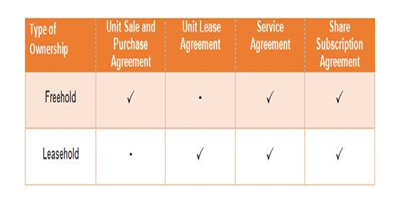THANK YOU FOR SUBSCRIBING
Editor's Pick (1 - 4 of 8)

Know Your Rights Before Buying a Residential Unit in a Mixed-use Project
Florian Maier, Managing Director, Antares Group and Phi Ploenbannakit, Director, Antares Group

.jpg)
Florian Maier, Managing Director, Antares Group
 Phi Ploenbannakit, Director, Antares Group
Phi Ploenbannakit, Director, Antares GroupForeign buyers are allowed to purchase residential units up to 49 out of 100. The remaining units must be sold to Thai nationals.
Thus, whenever a sale is advertised to unblock restrictions by saying all the units are available for sale to foreigners, it is wise to assume that the sale tends to be leasehold, in other words, a lease or sub-lease agreement with a limited term and other restrictions. 3. Unit Modification By default, the exterior design of the building is unlikely to be modified due to legal prohibitions and engineering limits. Interior modifications or renovations with light construction are normal to some extent. Although this seems to be a small issue, making a place fit for a home requires a lot of effort and cost. The fixtures and curtain walls are restorable, but could cause damage and incur repeated cost. Absolute ownership of the property under a freehold is more advantageous in this respect, provided the landlord imposes strict conditions and penalties to protect the leased property. 4. Unit Resale and Succession
Leaseholds are assignable under the law subject to the landlord’s consent. However, leasehold is automatically terminated upon the death of the tenant, unless it is otherwise explicitly agreed that the remaining contract shall survive the tenant’s death and pass on to the heirs. The assigned or resold leasehold to a third party carries forward the remaining contract, including the lease term. As such, the resale price depends on the depreciation of the remaining lease term.
The resale and succession of freehold property bears different implications. The property owner is entitled to enjoy a variety of profit-making endeavours i.e. renting out or resale by complete transfer of property to a new owner. The reselling price of a rare unit in a prime location is likely to bring a large return on investment when there is a turnaround in the economy. Theoretically, it could be treated as a fixed asset which can be resold and inherited by freewill.
5. Property Management
Property management after the sale is always an important consideration for residences whether the owner is living in the unit or renting it. It is especially important if they do not reside in Thailand. Mismanagement is likely to lead to an unpleasant living environment and an undervalued rent or resale price.
The Condominium Act governs freehold residential units, i.e. condominiums. The juristic person, whose board is nominated from and elected by the majority votes of the co-owners, is responsible for the day-to-day property management and common area maintenance of the property. The law is straightforward as it allows the co-owners to participate and make decisions through meeting resolutions on all matters related to the property.
The same rule applies to those freehold units in mixed-use projects as long as the residential zone has its distinct legal boundary regardless of any obstacle. However, property management becomes more complex when the structures, common facilities, or access areas are shared among residents, businesses, and visitors. The leasehold residences in mixed-use projects are even more complex when they are not recognized as co-owners under the Condominium Act.
III. How the property is managed in the mixed-use project?
Regardless of the freehold or leasehold acquisition, residential units in mixed-use projects are exposed to the change of shared space and facilities where the residents may not be able to take absolute control. Joint management control among the mix-used projects population, in absence of a condominium juristic person, is conceptually outlined by a contractual arrangement. The typical legal structure introduced by the developer is to set up a property management company. Both leasehold and freehold owners of the residential and commercial zones will be required to participate in the company’s share subscription. In other words, the persons who have the right to enjoy the private and common property in the project will respectively supervise and manage the property as stakeholders of the management company, i.e. shareholders or board of directors. The connection between the management company and property is bound by a service agreement where the fund is pulled from the stakeholders’ proportionate contribution to pay for service fees. The basic agreement package generally comprises the following:
Usually, the developers themselves will become the major stakeholders of the property management company considering the greater commercial space proportion they have on hand e.g. hotel, serviced apartments, mall, office, etc. The intention is to continue operating a constant rental business, all the while having part of the profits realized by the sale of residential units. Major control extends to the modification of common property usage e.g. facilities, connected access, landscape, etc. As such, the buyer of a residential unit in a mixed-use project, either freehold or leasehold, should also have adequate knowledge of corporate law and its implications to fully exercise his or her rights.
Final Thoughts
Freehold seems to be more advantageous than leasehold since it conveys superior ownership rights under the law, but a leasehold offered in a prime location is often irresistible and overcomes the legal restrictions on ownership. The key takeaway is in the case of a residential unit in a mixed-use project, the legal exposures to the common property management after sale can be equal for both freehold and leasehold. Therefore, uninterrupted peaceful living and right to enjoy the facilities around the project requires attention to the contract’s content and the applicable laws, which should be analyzed early before making a purchase decision.
4. Unit Resale and Succession
Leaseholds are assignable under the law subject to the landlord’s consent. However, leasehold is automatically terminated upon the death of the tenant, unless it is otherwise explicitly agreed that the remaining contract shall survive the tenant’s death and pass on to the heirs. The assigned or resold leasehold to a third party carries forward the remaining contract, including the lease term. As such, the resale price depends on the depreciation of the remaining lease term.
The resale and succession of freehold property bears different implications. The property owner is entitled to enjoy a variety of profit-making endeavours i.e. renting out or resale by complete transfer of property to a new owner. The reselling price of a rare unit in a prime location is likely to bring a large return on investment when there is a turnaround in the economy. Theoretically, it could be treated as a fixed asset which can be resold and inherited by freewill.
5. Property Management
Property management after the sale is always an important consideration for residences whether the owner is living in the unit or renting it. It is especially important if they do not reside in Thailand. Mismanagement is likely to lead to an unpleasant living environment and an undervalued rent or resale price.
The Condominium Act governs freehold residential units, i.e. condominiums. The juristic person, whose board is nominated from and elected by the majority votes of the co-owners, is responsible for the day-to-day property management and common area maintenance of the property. The law is straightforward as it allows the co-owners to participate and make decisions through meeting resolutions on all matters related to the property.
The same rule applies to those freehold units in mixed-use projects as long as the residential zone has its distinct legal boundary regardless of any obstacle. However, property management becomes more complex when the structures, common facilities, or access areas are shared among residents, businesses, and visitors. The leasehold residences in mixed-use projects are even more complex when they are not recognized as co-owners under the Condominium Act.
III. How the property is managed in the mixed-use project?
Regardless of the freehold or leasehold acquisition, residential units in mixed-use projects are exposed to the change of shared space and facilities where the residents may not be able to take absolute control. Joint management control among the mix-used projects population, in absence of a condominium juristic person, is conceptually outlined by a contractual arrangement. The typical legal structure introduced by the developer is to set up a property management company. Both leasehold and freehold owners of the residential and commercial zones will be required to participate in the company’s share subscription. In other words, the persons who have the right to enjoy the private and common property in the project will respectively supervise and manage the property as stakeholders of the management company, i.e. shareholders or board of directors. The connection between the management company and property is bound by a service agreement where the fund is pulled from the stakeholders’ proportionate contribution to pay for service fees. The basic agreement package generally comprises the following:
Usually, the developers themselves will become the major stakeholders of the property management company considering the greater commercial space proportion they have on hand e.g. hotel, serviced apartments, mall, office, etc. The intention is to continue operating a constant rental business, all the while having part of the profits realized by the sale of residential units. Major control extends to the modification of common property usage e.g. facilities, connected access, landscape, etc. As such, the buyer of a residential unit in a mixed-use project, either freehold or leasehold, should also have adequate knowledge of corporate law and its implications to fully exercise his or her rights.
Final Thoughts
Freehold seems to be more advantageous than leasehold since it conveys superior ownership rights under the law, but a leasehold offered in a prime location is often irresistible and overcomes the legal restrictions on ownership. The key takeaway is in the case of a residential unit in a mixed-use project, the legal exposures to the common property management after sale can be equal for both freehold and leasehold. Therefore, uninterrupted peaceful living and right to enjoy the facilities around the project requires attention to the contract’s content and the applicable laws, which should be analyzed early before making a purchase decision.
Weekly Brief
I agree We use cookies on this website to enhance your user experience. By clicking any link on this page you are giving your consent for us to set cookies. More info
Read Also
Navigating Compliance Challenges in ESG AML and Digital Onboarding
Chuan Lim Ang, Managing Director and SG Head of Compliance, CIMB
A Vision for the Future: Automation, Robotics, and the Smart Factory
Joe Tilli, State Industrial Automation Sales Manager, Lawrence & Hanson
The Rise of Hyper Automation
Erdenezaya Batnasan, Head of IT End-User Support Service Department, Khan Bank
Transforming Business Operations with Robotic Process Automation
Simon So, CMGR, MCMI, Regional Head of Digital Solutions, Richemont Asia Pacifi
Combining Automation with AI to Achieve Human-Like Interaction
Kain Chow, General Manager, Technology & Transformation, New World Development Company Limited
Implementing RPA - 5 Ultimate Prerequisite
Indra Hidayatullah, Data Management & Analytics Division Head, Pt. Bank Tabungan Negara
Incorporating the power of recognition into our vendors' sustainability journey
Cynthia Khoo, Head, Central Procurement Office, OCBC Bank (Malaysia) Berhad
Elevating Guest Experience with Data
Clive Edwards, Senior Vice President, Operations, Capella Hotel Group





















